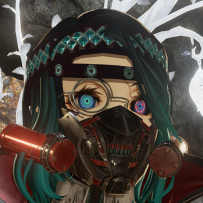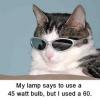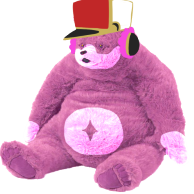Ooooooh tier talk. Looks like my statement of the day is "This old song and dance".
Now, here's the thing. Tiering is a complicated, complicated thing. When you analyze things, and "some things are more or less used and somethings do this or that" it gets really grey. The following example is based on the "common mentality", and might not apply to everyone, but more people will say that this doesn't apply to them, while it does, than people who it does apply to that will say it does, or to people it doesn't apply to at all.
Trends tend to happen in the game. When the game is first going to be played, and I mean for the first time, the metagame is going to be created. Things will come into play based on two factors, somewhat equally at that time; power and attractiveness. When you first play a game, if you think it's powerful, you don't truly know yetif it's useful. You haven't tried it out, you don't know the potential, unless you have done stat calculations against confirmed sets. On the other hand, you'll go for Pokemon you like, because you don't inherently know what is going to be useful, so you might as well enjoy it.
Step two happens. The things chosen have already been established at this point, and different picks will come out; picks based on "how do I beat my opponents common and most potent threats" will happen. But that will come out prominent and dominant. After you realize that what you like might not be the best, you'll tend to drop the ineffective things you might like in order to counter the opponents picks. You'll test that, and use what opponents used that worked and suited the role you need. You'll find it working, not working, and you'll still experiment. You'll replace more things for the sense of "success", trying to replace the already successful with better.
Step three happens; a new game comes out. People at this point try to play like they once knew how; even though threats change, moves come out, sometimes new types come out. Things rise and fall; but people don't react flexibly to change unless they had to. They'll test things out, they will inevitably experiment with the new toys, try to learn. But that old standard will still be inevitable. They'll still use the same things they did last time without recreating knowledge from the ground up. They do react, but not flexibly. Step x/y/z basically results in this reoccuring, time and again, without an inherent differentiation.
I brought it up, because we're at that step x/y/z in the game. While I do indeed see people playing with new toys, I don't see it inherent amongst everyone. I see an overwhelming amount go and say "this still works" even though it was a gen 3 strat, something made only for one purpose, but not inherently classified correctly. Yes, we have tiers with name based usage; but we hardly can justify that for a few reasons.
One of the reasons is that we're emulating another places basis for tiering, while not being that place. That inherently will influence the decisions made by our community directly. If people decide they will go out of their way in order to find something; it's their choice to make that decision. If we put it right in front of them, it strips them of the decision of how to improve, and will change what is used, rather than allow the user to make that decision independantly; even if they decide to go and emulate that place, it's the users decision, and that's the idea behind the metagame - to have the users decide how they want to play and what's best for them. Another reason that we have trouble justifying it is that we have such a smaller base than what's normally a comfortable level to do this statistical gathering at. People that come and go battle just as frequently as the users that are here every day, and that's an issue. There's no way to seperate the people, and while this is the least problematic in theory, since we literally just have to deal with it, it stacks on with my following and final reason.
The final reason? We have too many people acting like they're making a metagame impact without willingly putting in time and effort to find out if they have valid reasoning, without testing solutions rather than "raging" at the thing they dislike, without typing more than two sentences and claiming they have all the proof they need, without being capable to make counterpoints and hold a conversation that moves in a forward direction, and/or without even being able to do so much as hear the words "tiering chat" and start complaining like a toddler because they "don't wanna hear it". I'm not trying to start anything, nor am I trying to belittle the community;...
It's true! I wouldn't dare say it otherwise. When it comes down to it; almost, if not all tiering discussions have resulted in something mentioned earlier - raging, scattered and flawed ideas about why something is so (just to be disproven yet the proof is ignored in favor of the opinion), or even as much as an auth not wanting to see it because it doesn't sit well with them. This is not only unintegral to what was at least supposed to be a Pokemon community, but instead it is inevitably toxic to the development and will push us in the direction of losing what was supposed to be the (general) focus all along.
Even though it might not be as long as my other points; I don't think I need to say anything else on the subject.
Good question, imposed entity that's not supposed to be me typing but is! What the solution is, isn't concrete. Unfortunate, but true. The solution lies within the individuals...but that's the problem. Each individual needs to put in time nad effort to prove to themselves that the idea they have, is truly worth having. To some, this just proves itself in five seconds of a badly played matchup, which is erroneous, and to others, it happens based on theorycrafting.
For me, I've taken upon a project long ago, and will shortly resume it. (Some of you know that I've dealt with my computer not being around since late march until Christmas). So, when gen 6 settles, or I get my information more importantly, I'll try unvieling the prototype and we'll work through the details. It might not be the topic in this thread, but it is tiering. That's all I'll say about it though.
Overall, I hope that I got a point across and didn't waste my morning typing this. My points are valid; having participated and inherently studied metagame processes on both mechanical and psychological levels, for both communities and outside documentation, I do know what results provide fruitiful. As they say though... "You can lead a horse to water...but you can't make it drink".
















